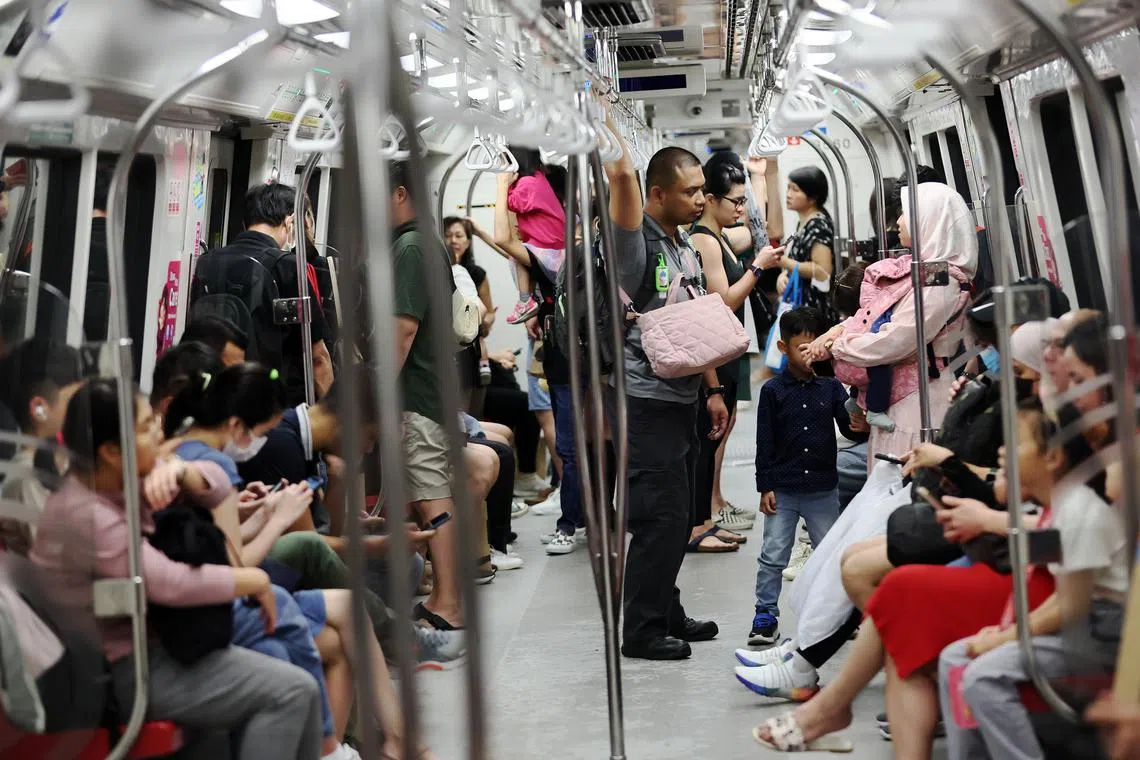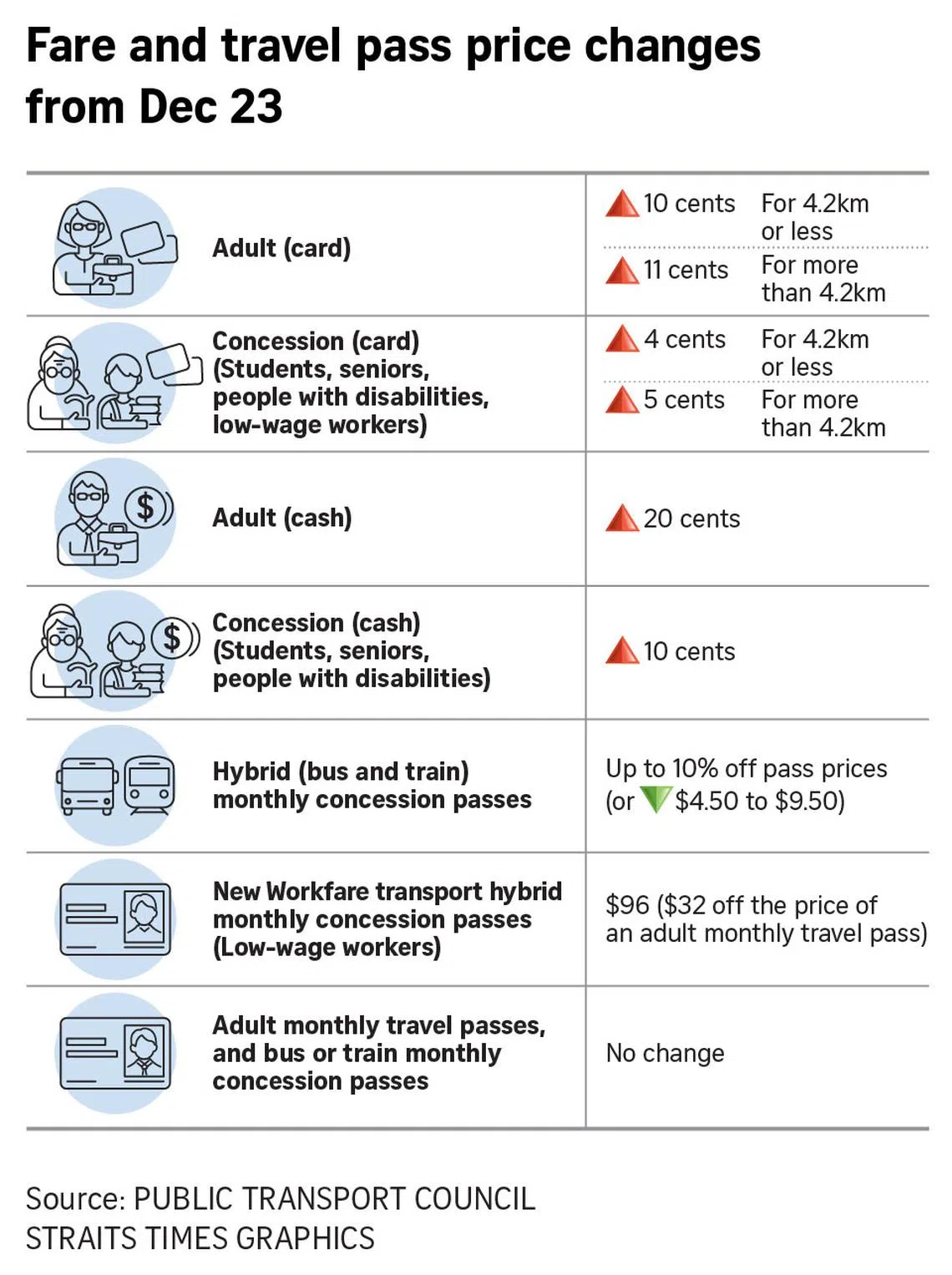Calls by MPs to expunge or freeze future fare hikes ‘not sound’: Chee Hong Tat
Sign up now: Get ST's newsletters delivered to your inbox

Bus and train fares will go up by 10 to 11 cents for adults who pay by card from Dec 23.
ST PHOTO: KELVIN CHNG
Follow topic:
SINGAPORE - Calls by MPs to put a freeze on future public transport fare hikes, or expunge a 15.6 per cent increase that has been deferred to future fare review exercises,
Acting Transport Minister Chee Hong Tat said this in Parliament on Tuesday as he pushed back against suggestions by Workers’ Party (WP) MP Louis Chua (Sengkang GRC) and Mr Don Wee (Chua Chu Kang GRC).
Mr Chee said the proposals were “not sound” and “populist”, and would affect the longer-term reliability and financial sustainability of Singapore’s public transport system.
Expunging the deferred fare increase or freezing fare hikes does not mean the costs of running the system will “simply disappear into thin air”, he said.
Mr Chee asked both MPs to clarify if they were proposing that transport operators absorb these costs, or taxpayers bear a larger burden to permanently provide higher government subsidies.
“If it is the latter, they should elaborate how such a move will be funded every year and whether they are proposing for Singaporeans to pay additional taxes to do so,” he added.
Mr Chua and Mr Wee were among eight MPs who asked about the planned 7 per cent increase in bus and train fares, which will go up by 10 to 11 cents for adults who pay by card from Dec 23.
This is the steepest increase since 2019, when fares rose also by 7 per cent. The 11-cent hike is the highest on record.
The Public Transport Council (PTC), which regulates bus and train fares here, said the increase in 2023 could have been as high as 22.6 per cent, after adding a 10.6 per cent hike that was deferred from the 2022 review.

The PTC decided to defer 15.6 per cent of the maximum allowable increase for 2023. To cover this shortfall, the Government will provide an extra $300 million in subsidies on top of the $2 billion it already shells out every year to keep services running.
In their questions, both Mr Chua and Mr Wee had highlighted the profits made by public transport operators here over the past few years.
Mr Chua pointed out how one operator generated a return on equity of close to 11 per cent in the past year and 13 per cent in the last five years. “In that sense, I struggle to see how the financial sustainability of the operator at this point in time is actually in question,” he said.
In response, Mr Chee said the PTC’s fare formula – which takes into account core inflation, national wage growth and energy prices – reflects real cost increases in the economy, not the actual cost increases borne by the operators.
“The operators cannot assume that their cost increases will be matched by correspondingly higher fares. Hence, they need to be disciplined in managing their costs and improving their productivity over time,” he added.
But he noted that the operators’ ability to provide reliable public transport services will be affected if they are made to absorb all the higher costs.
Bus and rail services operate under different financing models and need to be looked at separately, he said.
For buses, the Government collects fares and pays operators a service fee via a contracting model.
Mr Chee noted that bus services have been operating at an overall loss, which is why the Government subsidises bus operations to the tune of $1 billion each year.
“Expunging the deferred fare or freezing future fare increases will result in larger losses and higher government subsidies,” he said. “We need to be clear that government subsidies are ultimately borne by current and future generations of taxpayers.”
Mr Chee said bids for bus contracts have become more competitive over time, and service fees paid by the Government have gone down. “Hopefully that... will allow us to squeeze out more productivity gains, more savings that we can then pass on to taxpayers and commuters.”
For train services, operators SMRT and SBS Transit (SBST) collect fares to cover their operating costs. Changes in fares will thus impact their profitability, Mr Chee noted.
He said SBST reported a loss of several million dollars for its rail operations in the latest financial year after accounting for government grants, while SMRT’s rail business reported an operating profit of $6 million, which represents a profit margin of less than 1 per cent.
Turning to affordability, he said the authorities are committed to ensuring fares remain economical, especially for seniors, students, lower-wage workers and people with disabilities.
He added that the PTC measures affordability based on the estimated proportion of household income spent on public transport.
For the lower income, this has fallen from 3.1 per cent in 2013 to 2.4 percent in 2022. For average public transport users, the proportion fell from 2.2 per cent in 2013 to 1.7 per cent in 2022.
Mr Chee also noted how there is a wide range of spending on public transport, even across the various concession groups. For instance, the median monthly spending by seniors is about $16, compared with $24 for people with disabilities and $35 for those on the Workfare Transport Concession Scheme (WTCS).
As heavy users of public transport will be more affected by the coming fare hike, he said the Government will cut the price of hybrid monthly concession passes by up to 10 per cent and introduce a new discounted WTCS monthly pass.
To better help the lower income, resident households with a monthly income of up to $1,600 per person will also be given public transport vouchers worth $50 each, an increase from $30 in 2022 when adult fares were raised by four to five cents.
WP MP Gerald Giam (Aljunied GRC) asked if the value of these vouchers could be increased further, noting that $50 covers less than two weeks of travel for a family of four.
He also asked if the vouchers could be given out on an individual basis instead of by household.
Mr Chee said the vouchers are not designed to defray the entire public transport expenditure of households but to cushion the impact of the fare hike.
He estimated that a $50 voucher would cover about six months of the upcoming fare increase.
Households that are not eligible for the vouchers or that need more help can make an appeal at their local community club from early 2024, he added. These appeals will be considered on a case-by-case basis.


